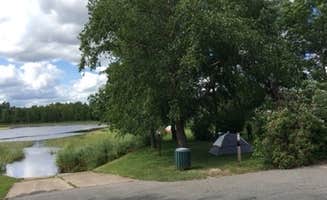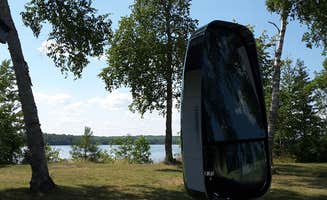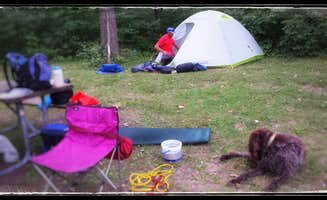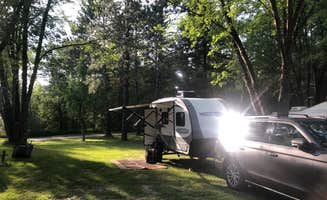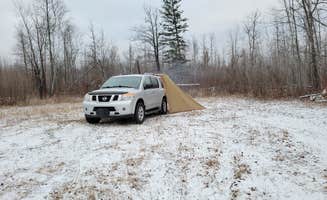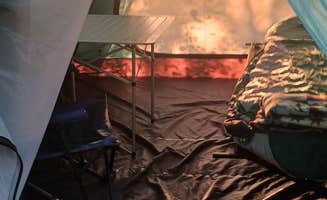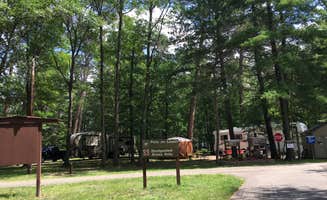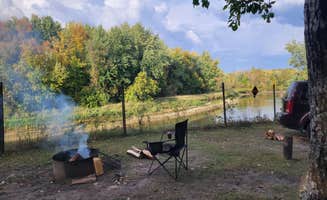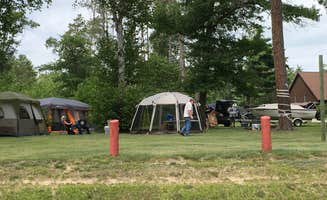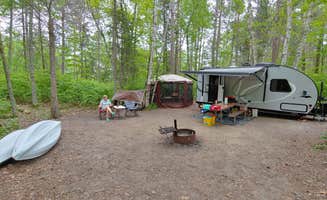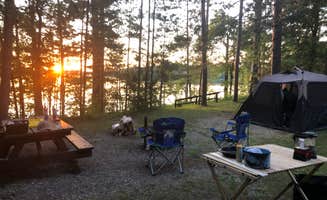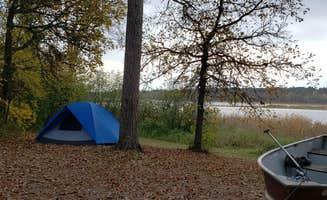Cohasset, Minnesota sits at an elevation of 1,305 feet in north-central Minnesota, where the Mississippi River flows through several lakes near the western edge of the Chippewa National Forest. The camping season typically runs from late April through mid-October, with July temperatures averaging around 80°F during the day and dropping to the low 60s at night. The region's forests contain primarily pine, birch, and aspen trees.
What to do
Fishing in local lakes: North Star Lake in the Chippewa National Forest offers excellent fishing opportunities with multiple bays. "We spend many hours fishing the many different bays of North Star Lake with luck catching Muskies," notes a visitor to North Star Campground. The lake is accessible via stairs from some campsites, with a public boat launch less than half a mile from the campground.
Paddle the Mississippi Headwaters: For canoe and kayak enthusiasts, the Mississippi River Water Trail passes through the area with dedicated paddler campsites. "This is a recently developed campsite for through-paddlers on the Mississippi Headwaters Water Trail," writes a reviewer about Grand Rapids Library Park Watercraft Campsite. The site offers amenities like "a fire ring and a couple of picnic tables, along with a lockable bear-box" for securing valuables.
Visit nearby historical sites: Located a short drive from most campsites near Cohasset, the Minnesota State Forest History Museum offers educational displays. "The Forest History Center with a recreated logging camp and a nice museum" is mentioned by a camper at Schoolcraft State Park as a worthwhile nearby attraction.
What campers like
Secluded forest camping: The Marcell area of the Chippewa National Forest offers dispersed camping options with varying levels of accessibility. According to a review of Marcell Area, "Some are only a short walk from the (usually small) parking area, some are a mile or two backpack-in and others are only accessed by canoe or kayak. They vary in degree of how 'primitive' they are - some have only a rock fire pit while others have a metal fire pit, picnic table and pit toilet."
Waterfront sites: Many campgrounds offer direct lake access. At Trout Lake Campground, "The park is mostly occupied by seasonal campers who take advantage of the amazing fishing in the lake, but, there are some sites for transient RVers and tent campers." Visitors appreciate that the campground is "right on a lake" with "a nice sandy area by the lake to enjoy."
Peace and quiet: North Star Campground provides a tranquil experience away from crowds. A camper reports: "Needless to say, other than an occasional motorboat on North Star Lake, the only noise was the cry of the loons and the call of an Osprey." Another adds, "A must go to if you want listen to loons and see the stars."
What you should know
Seasonal challenges: Mosquitoes can be intense, especially near water bodies. Pack adequate bug spray during summer months. Weather conditions vary significantly - July and August are typically warmest and driest.
Reservation options: Many campgrounds in the area operate on a first-come, first-served basis. As one camper at Schoolcraft State Park Campground notes, "We are visiting during Labor Day weekend and there are still sites available. I think next time we visit this park we will skip the $7 online registration fee and just take whatever site is available because this campground just doesn't fill up."
Varying amenities: Facilities range from primitive to comfortable. At Pokegama Dam Campground, there's access to "bathrooms, showers, potable water, and a kids playground." Meanwhile, dispersed sites in the Marcell Area are more basic but "are well traveled and taken care of. It's nice to see people adhering to LNT principles."
Noise considerations: Some campgrounds experience noise from nearby roads. A visitor to Trout Lake Campground mentioned, "The campground is next to a busy road so if you're looking for peace and quiet you will not get it here."
Tips for camping with families
Kid-friendly facilities: Look for campgrounds with designated play areas. "There's a great playground for kids, and a big picnic shelter that's reservable," reports a visitor to Pokegama Dam Campground. The same camper notes the campground offers "a thoughtfully designed handicapped accessible campsite" for families with accessibility needs.
Swimming options: Several campgrounds feature beach areas ideal for families. Prairie Lake Campground provides "a great area for both boats and swimming," making it suitable for children of various ages and swimming abilities.
Educational opportunities: Combine camping with learning experiences at nearby historical sites. "Don't miss the Suomi Hills hiking trail" recommends a North Star camper, while another mentions that "the Forest History Center was great! History of logging in the area and we saw a draft horse pulling logs for demonstration."
Tips from RVers
Site layout and access: Pay attention to pad orientation at campgrounds. At Trout Lake Campground, "we loved that we were able to pull right onto the gravel pad and it was level so we didn't need to take extra time to level out the camper. The 30 amp electrical and water hookups were nice however they were on the wrong side of the pad which we thought was odd."
Large sites available: Some campgrounds accommodate bigger setups. At Prairie Lake Campground, the owners are "very friendly and very accommodating," and "anything that was needed could be available!" The campground has "a great vibe" that reviewers "would highly recommend for both tent and RV experiences."
Dump station locations: Note where services are available. North Star Campground has a "dump station in the town of Marcell" rather than on-site, while Pokegama Dam Campground offers "a roomy area for dump/fresh water/drinking water fill."


